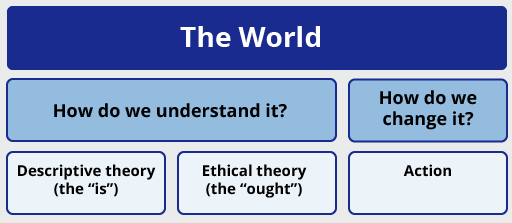6.4 The role of theory
You have been introduced to a variety of teaching principles in this Module which will help you deliver engaging and effective anti-corruption, integrity and ethics learning opportunities for your students. In doing so you have been introduced to a number of ethical theories. In this section you will explore the nature and role of ethical theories in more detail and consider how they are used within the E4J Integrity curriculum.
The moment we – as human beings – express a desire about the way something should be, we use ethical language. By suggesting that something should be different, we are doing the grading, evaluation and comparison (Newman and Blackburn, 2002, p. 4). We suggest that something could be better, and by implication we support the idea that some things are better, more desirable or more acceptable than others.
The illustration below explains the role of theory – it helps us to understand the world, but theory by itself cannot change the world; we need action. Action – and hopefully ethical action – will be informed by theory. Any theory that addresses the way things should be or ought to be – as mentioned above – can be classified as an ethical theory.
The E4J Anti-Corruption, Integrity and Ethics Modules address three of the major Western ethical theories: utilitarianism, deontology and virtue ethics. The critical contribution of non-Western philosophy is acknowledged but not addressed in detail in this online training course (although some Chinese ethical theories are briefly discussed).
Modules in the E4J Module Series on Integrity and Ethics that discuss non-Western approaches to ethics include Module 2 (Ethics and Universal Values), Module 4 (Ethical Leadership), and Module 5 (Ethics, Diversity and Pluralism). It is noted that the approach known as ethics of care, while not discussed in this training course, is defined and addressed in Module 9 (Gender Dimensions of Ethics).
No best theory
The E4J Modules do not seek to promote one particular ethical theory. All major ethical theories have strengths and shortcomings. There is no confirmed “best theory” and individuals are encouraged to develop their own preferences and make their own choices.
Theories provide assistance
All the theories presented in the E4J materials can be considered together to provide assistance to make a specific choice. Often instinctive choices are made without reference to an ethical theory, although this could perhaps be best explained by virtue ethics. One risk is to make a predetermined choice about a preferred action, and then to find an ethical theory to justify a decision. Such an approach lacks consistency and, hence, also lacks integrity.
6.3 Developing ethical learning environments

